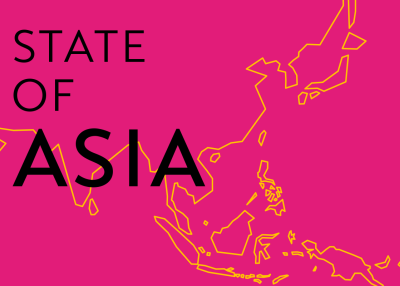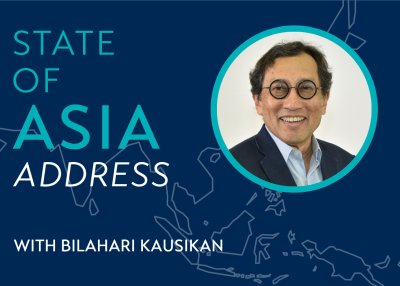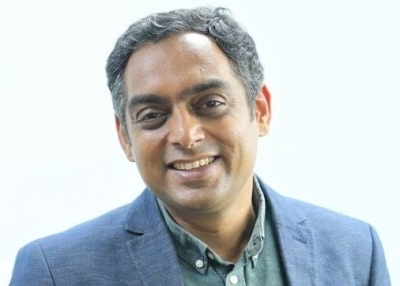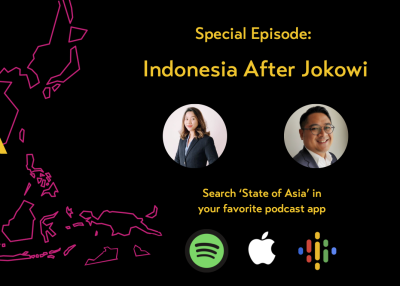State of Asia with Bilahari Kausikan
On accidents, agency, and being not unhopeful
GUEST ON THIS EPISODE

Bilahari Kausikan has spent his entire career in the Ministry of Foreign Affairs of Singapore. During his 37 years in the Ministry, he served in a variety of appointments at home and abroad, including as Ambassador to the Russian Federation, Permanent Representative to the UN in New York, and as the Permanent Secretary to the Ministry. Throughout his career, he obtained a reputation for not mincing his words. Raffles Institution, the University of Singapore and Columbia University in New York have, as he puts it, all attempted to educate him.
In this episode, Bilahari explains why he's not unhopeful about the state of the world, China's fundamental dilemma and how, as a small country, you can still have agency on the global stage.
Bilahari will be in Zurich to deliver our annual State of Asia Address on November 21. This event is open to the public at no cost. He will also share his insights at the STATE OF ASIA conference on November 22.
STATE OF ASIA podcast
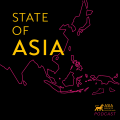
Season 5, Episode 1 – published September 19, 2023.
Host and Producer: Remko Tanis, Programs and Editorial Manager, Asia Society Switzerland
Find previous and future episodes here, on Spotify, Apple Podcasts, Google Podcasts, or search for 'State of Asia' in any other podcast app. We're also on YouTube.
Transcript
00:00:00 Remko Tanis
From Asia Society Switzerland, this is State of Asia. We're back with a new series of engaging conversations with leading minds on issues that shape Asia and affect us all. My name is Remko Tanis. Today I'm speaking with iconic veteran of diplomacy Bilahari Kausikan,
former ambassador and permanent secretary at the Ministry of Foreign Affairs of Singapore.
Bilahari explains why he's not unhopeful about the state of the world. The fundamental dilemma facing China and how, as a small country, you can still have agency on the global stage.
This fall, Bilahari will be in Switzerland on November 21st, he will deliver our annual state of Asia address at the prestigious aula of the University of Zurich.
He will also speak at the State of Asia conference, the next day. More info on how to get tickets to both events is on our website. The link is in the show notes.
00:00:58 Remko Tanis
Bilahari Kausikan spent 37 years working for the Ministry of Foreign Affairs of Singapore. In that time, he served in a variety of appointments at home and abroad, including as ambassador to the Russian Federation, Permanent Representative to the UN in New York and as the Permanent Secretary to the ministry.
Raffles Institution, the University of Singapore and Columbia University in New York have, as he puts it, all attempted to educate him.
Throughout his career, he was known as a diplomat who does not mince his words and he still doesn't. Bilahari Kausikan, welcome to State of Asia.
00:01:32 Bilahari Kausikan
Well, thank you for inviting me.
00:01:33 Remko Tanis
I was watching a video of the book launch of your latest book. The updated Singapore is still not an island. The collection of your op-eds, speeches, etc. The book was launched this summer in July. At the launch event, one of your former colleagues, Ambassador Ong, said: We were all very happy when Bilahari retired, thinking we would get some reprieve from him. Why did he say that?
00:01:53 Bilahari Kausikan
It was a joke. A joke.
00:01:56 Remko Tanis
OK.
00:01:56 Bilahari Kausikan
I was their Permanent Secretary, so I guess I drove them a little hot.
00:02:01 Remko Tanis
You have the reputation of being quite straightforward.
Is that right?
00:02:04 Bilahari Kausikan
I find it it's simpler that way. I mean there is a misconception about diplomats that you should speak obliquely. You should be circumlocutory in your expression and so on. I find that usually causes much more trouble. It's much simpler to speak clearly and plainly rather than to be misunderstood and then have to correct things. Of course, it doesn't mean that you have to be rude.
But as somebody once said, a diplomat is somebody who is not rude accidentally. In other words, you know diplomacy is not just about being nice, agreeable, pleasant and so on. It is about advancing your country's interests, preferably by being nice, agreeable, pleasant, but if necessary, by whatever works.
00:02:44 Remko Tanis
The definition of being diplomatic is, like you said, to be very prudent. Why is that?
00:02:49 Bilahari Kausikan
That is extremely misleading. Well, I think people may actually not go around poking other countries in the eye, right, as I said. But you know your fundamental job.
It's only the poorest sort of diplomat and those who don't get very fine in their careers who think that, you know, being pleasant is the end of diplomacy. It's a means. So your end of diplomacy is to advance your country's interest, preferably by being pleasant about it. But if necessary, by being tough by being unyielding and if necessary by being rude. As I said, a diplomat is never rude by accident.
00:03:24 Remko Tanis
You used that word accident again and I read an interview with you last year where he said, well, I ended up or started at the Ministry of Foreign Affairs of Singapore by accident. You first tried academic career in journalism a bit. Why is it by accident? Was it really not in your planning to start this career 37 years ago?
00:03:40 Bilahari Kausikan
No, no, actually, no. I wanted at first to be an academic and I got a scholarship from the US government to do a PhD in at Columbia University in New York. And then one day after I got through, you know, the PhD program in the US is a very long, drawn-out, tedious process.
I think they adopted from the Germans. That's why it's long drawn out and tedious.
OK. All right. You have to do a lot of irrelevant things before you get to doing whatever you want to. Anyway, I got through all the qualifying stuff and I was writing my dissertation and one day it was. It was an autumn day. So the days were going shorter and I had come out, I emerged from the bowels of Lowell Memorial Library, when I had an epiphany, the epic for me was, you know, I haven't seen the damn sun for more than a week because, you know, the days are short. But the time I went to the library, it was still dark by the time I got out, it was dark. And I asked myself, do I really want to do this for the rest of my life and the answer was obviously no.
So I quit. I went back and the deal was that they gave me this scholarship. I was supposed to go and serve in the university for some time. But you know, I I said I don't want. My career goals have changed. A long story short, they say where do you want to go? And I without thinking too much of it, said the Ministry of Foreign Affairs. And then I stayed there 37 years, always forgetting to leave.
I forgot to leave because I was having fun and I thought I was doing alright.
00:05:09 Remko Tanis
Right, right. You have been ambassador in quite a few interesting places. The UN of course and Moscow. What? What is it like when you first get to a place like that as an ambassador? How do you get to know the place? How do you get to feel like, like you mentioned at the beginning, I'm a diplomat, but I like to not poke themin the eyes but still be clear in my intentions. How do you do that?
00:05:29 Bilahari Kausikan
Well, first of all, you should start trying to get to know the place before you arrive there by reading, and so on, reading not just the files, but you know reading widely. It helps that I don't have too much, too many hobbies, etc.
Yeah, walking and reading and a beer now and then, which you can do with bar reading. So when you get there, I think any diplomat is, you know, the first thing you should do is to meet as many people as possible, not just people in the foreign ministry, but as many people, people outside government, people in the main industry. And you should walk the streets.
I am a great believer in learning a country through the souls of your feet. You know, walking around, run, you know, poking around in all corners, you know, and just absorbing things by osmosis. I find that a common mistake among many diplomats for many, it's they spend too much time with their colleagues and not enough time with their host country people.
00:06:18 Remko Tanis
You also said you have to view the world as it is, not as you hope or fear it to be. How is the world now?
00:06:24 Bilahari Kausikan
The world is in, well, I don't think you are in Europe, right. The war in Ukraine and US-China strategic competition has made the world uncertain, an unpredictable place, that's for sure. But is this something unusual? I beg to differ.
This is usual. The competition between states and the possibility of competition turning into conflict is inherent in as part of international relations. Since time in memorial, if you look at the 20th century, it was a century of almost continuous conflict, much more than, say, the 19th century, 18th century, 70s, and go back as far as you won in history.
Right. And it's inherent in the nature of international relations and perhaps in something very dark in human nature, but this harsh quality was masked for a relatively short period, maybe 20 years or so from 1989, when the Berlin Wall came down and the Cold War ended by the overwhelming dominance of the United States for a short period in the immediate aftermath of the burning war coming down the Soviet Union.
And then Russia was in an extremely incoherent state of affairs, and he was not in a position to play.
1989 was also the year Tiananmen happened in China. And the Chinese were internally preoccupied. They are always internally preoccupied by more than usual. It had not yet begun to grow in earnest. That only happened in the 1990s and the early 2000s. So that was a very exceptional and historically short period of history. And we have now returned to a more normal period of world history.
00:07:55 Remko Tanis
You mentioned this great power competition. US-China tensions. I want to get back to that. But first, the war in Ukraine. I'm talking to you from Europe. You're viewing the world from Southeast Asia, from Singapore. Do we in Europe see the war in Ukraine as too big a thing? It's a major thing, of course, but too big a thing compared to if it were to happen in another region of the world.
00:08:15 Bilahari Kausikan
Yeah, I think so. Look, Russia's invasion of Ukraine is certainly a very egregious violation of some very fundamental principles. In other words, if I don't like what you're doing and I'm bigger than you, I don't want. I'm not supposed to, really smash in your face by faults. OK, but is it unusual? I don't think so. How is it different from the American invasion of Iraq? The American interventions supported by Europeans, by the way, in Afghanistan, in Libya, in Syria, how is it different except that it's happening in Europe and even don't forget, even in that rather unusual period of world history?
Many years or so, there were vicious conflicts in the pockets which is in Europe the last time I checked the map, there were vicious genocidal conflicts in Rwanda in Africa, and that's when the invasions of Iraq and Afghanistan began. And even if you look around the world today, conflict is right. And so why? Why is this different? I understand if the Europeans consider it different because it's right on your borders, right. That's quite understandable. But my point is really, I think Europe in general would do well to speak more about interests and less, well, as if this is a clash of values, it is to some degree a clash of values, but really there were other clash of values in which it didn't make such a big fuss because they seem far away, right? But in principle the principle is the same and that's why I think you should be aware that support for the war in Ukraine, I mean the Global South understands the principals involved.
But they do see double standards. They do see certain amount of hypocrisy. Now, mind you, I believe double standards and hypocrisy are inherent in international relations too. I think you'll be better served instead of talking about grand principles like this is a this is a a contest between democracy and autocracy.
Say that my interests are affected, that people can understand better.
00:10:03 Remko Tanis
Last year, we spoke with James Crabtree in an interview you mentioned to manage geopolitical competition, we have to keep our sense of hard headed clinical realism, which I fear is being lost. This is how you were quoted and you said and that is, I fear that's being lost, partly because we had an outbreak of democracy in Southeast Asia and foreign policy gets contaminated by sentimental considerations.
Could you elaborate? I I don't believe you're opposed to democracy.
00:10:26 Bilahari Kausikan
No, I'm not.
00:10:26 Remko Tanis
But why did you put it that way, that we are troubled by an outbreak of democracy in Southeast Asia.
00:10:32 Bilahari Kausikan
I put, I put it that way, partly for effect. You know, I'm not against the democracy, of course, right. And I'm not nostalgic for an earlier period when there were autocracies throughout our usage of different degrees. But I think you have to understand that there are different degrees and different types of democracy too. And whatever the type democracy in its simplest meaning means you got to win elections.
And you gotta win elections means that you got to do things that may not be in your foreign policy interests. You know, most people in most countries are not particularly interested in foreign policy. That's true for Singapore. That's true for Switzerland, true for most countries you can think of, and so you can't take a clinical view anymore. Every foreign policy has to rest on a on a strong domestic consensus. Now, Once Upon a time, that domestic consensus was a few people. Now it is pretty much the entire population.
Including in communist countries like Vietnam and Laos. Because they have become more pluralistic. You can't rule in the old ways. Your populations have become more educated. They are more exposed to the world. So you have to rule in a different way. But the fact is that that contaminates the clinical calculation of your interest. Now, that's true in Europe, you know, for a long time, until you had a huge shock about Ukraine, right.
For a long time, all European countries, maybe not Switzerland, because you have a different system. I mean, I'm talking about EU countries and members of NATO, right, they neglected their defense spending, their ability to deter eroded drastically. That is so because the European social model of which they are rightly very proud and which forms a very large part of European identity, it's not sustainable as a matter of demographic certainty. But it's very hard to cut. Social spending politically hard, I mean. So what do you do? You cut defense spending? Because who's gonna complain about that except for a few professional soldiers? And who the hell cares or what they think? In other words, they cashed in a peace dividend, which I think is largely mythical anyway, given the nature international relations. They restock that historically short and abnormal period for the norm and acted accordingly because it was the electorally easy thing to do and now they're paying a price.
So that's what I mean by clinical realism being eroded, because if you were clinically real, you would say, OK, you look around the world says OK. Good. I'm glad that the immediate tensions of the Cold War have ended. But is this a fundamentally different world as the nature of international relations fundamentally changed? And if you were, you took a clinical view of things you would certainly in my view, no, we are not quite in that same dire situation in Southeast Asia because I don't think we ever thought that there was a peace dividend, right. But the general dynamic of which this is one example does pertain, can't be helped, you know, because the world is becoming more pluralistic.
00:13:17 Remko Tanis
If we look at, for example,just recently we saw the BRICS meeting in South Africa where they invited five other countries to join. I read a piece in the in the Financial Times that said, well, the only mortar holding the BRICS together is a grievance against the West. Is grievance a useful tool in foreign policy?
00:13:35 Bilahari Kausikan
I don't think. I think I read that same Financial Times article. I think it overstated the case. Let's start from first principles. How did the term breaks arise? It arose from a fund manager as a slogan designed to part the unwary from their money.
It was not a geopolitical concept and it's still not a coherent geopolitical concept. That said, I think the word to use the word grievance is to overstate the case, as columnists or often do because they need eyeballs. I would say that the BRICS represents a mood, a mood among the Global South rather than any real convergence of interest.
OK, let me try to describe the mood.
I think the mood is that we have long gone from the days when the West, North America, Europe, can be the only determinant of the rules of international relations, but if you look at the even with the expansion right, which are the only two countries in the BRICS which are really have real deep grievances against the present international order, probably only Russia and Iran, even China is one of the major beneficiaries of the current order. So it has certain resentments. India certain has certain resentments. Saudi Arabia, you name it. Brazil. They are part of the international order. They may not like this bit or that bit, but to use the word grievance is too much.
But the general idea I agree with: this is not a geopolitical coherent grouping, right. It is a reflection of a certain mood and it will not. It will not go too far. It will not amount to very much. The original BRICS didn't amount to very much. Neither will expansion. Expansion will only make it more incoherent.
But look at the new structures in my part of the world: who created the Quad and who created AUKUS? It was Mr. Xi Jinping. Who revitalized NATO? It was Mr. Putin, and this is also a very fundamental dynamic of international relations.
If countries feel threatened, they will seek out other countries with similar perceptions and see what they can do together. I don't think America created the Quad. American diplomacy would be not capable of doing it if there was not this sense of common threat. I don't think America, how many American presidents have tried to get the EU to take their own defense seriously?
They all fail. It's Mr. Putin who did it. You should put up a small bust to Mr. Putin in NATO Headquarters.
00:15:53 Remko Tanis
Xi Jinping is, you said, the worst foreign policy Emperor China has ever had.
00:15:58 Bilahari Kausikan
In recent times anyway. There were far worse in ancient times, they were far worse ones.
Alright, alright. Look, cast your mind back to the Beijing Summer Olympics in 2008.
China was riding high throughout the world.
Yes, there were some problems over human rights issues like Tibet and so on, but by and large, everybody admired China. Right now you look around the world. I can't think of any country, including some, that are very dependent on China, that don't have concerns about one aspect or the other of Chinese behavior. How is this a successful foreign policy? A couple of years ago, Mr. Xi Jinping himself told a group of his countries that they must make China more lovable, more respectable and widen the circle of threats. Now that seems to me to be something of an admission that it is not lovable. It's not quite respected. Its reputation is certainly better in the global South than in the global North, but the fact is most of Chinas economic interests are in the global North, not in the global South. In the global South. It's a source, it's a market. But these are generally poor countries and you need rich countries to have good markets.
They are the sources of the technologies you need and which you have been cut off from, some in some areas and in the global North. I think Mr. Xi Jinping made two fundamental mistakes. First, it's not he didn't start them by the way they started at the at the end of the Hu Jintao era, right after the global financial crisis. But I think there were two fundamental mistakes.
First of all, they began to believe their own propaganda that Chinas rise was unstoppable and the West declined. Was not just relative, but absolute. And because of that fundamental mistake, they prematurely abandoned themselves beings. Very wise policy of hiding your capabilities and bidding your time. I don't think these things can be reversed because the problem with prematurely showing your capabilities or your ambitions means that nobody's gonna forget it after that, right?
Alright, so I think the main moves were made by Mr. Xi Jinping. In fact, I'll go further, look at his internal governance things that he started in the 1st 10 years of his rule. Can you name a single one that you can honestly call an unqualified success. There are no major failures, but there are no unqualified successes. Even his signature belt and Road initiative, which I've never been too impressed by, by the way, well, there's not so much boasting about it.
They never abandoned it, of course, but many of these projects are not viable. Many of the credit that China has extended in the global South for these projects, these are never going to be repaid. They will never be going to be repaid. The Chinese are beginning to understand this.
And you see Chinas economic situation right now that is directly attributable to some fundamental things that that did not occur under Mr. Xi Jinping.
00:18:43 Remko Tanis
You mentioned economic situation. We are reading a lot about now of course in China and you said well, China or Xi Jinping, one of his mistakes was he started to believe his own propaganda that the West is in decline.
00:18:53 Bilahari Kausikan
Absolute decline.
00:18:54 Remko Tanis
Absolute decline, yes. And now we're reading all these pieces and we're hearing all these stories about China, the economy going bad. Are we actually making the same mistake now thinking it's going worse than it actually is. Is China much more resilient than we would want it to be?
00:19:12 Bilahari Kausikan
Yes and no, OK. Yes, I think you should not indulge your wishful thinking and thinking that China is now in decline. It's not. It's quite a resilient system and it's quite a adaptive system. However, there is a fundamental issue that has been postponed and cannot be postponed indefinitely. I think China is reaching an inflection point. What you see in the property market in local government debt in the softness in the commercial banking sector. These are symptoms of a much more fundamental issue. In 2012 at the 18th party Congress, the 18th Communist Party of China, the party itself acknowledged that the growth model that had given its spectacular results throughout the 1990s and in the first decade of the 2000s was not sustainable. That growth model basically was a very heavy emphasis on investment in infrastructure, led by state owned enterprises, and they acknowledged themselves that it is not sustainable and the next year, 2013, they rolled out in some detail a new growth model that had at its center the promise to give the market a decisive role. That's their code, decisive role in the allocation of resources, in other words, more economic efficiency. Now, very little of that new growth model has been implemented.
I've read some academic studies that suggest maybe no more than 15-20%. Now. Why is this so? On the one hand, they acknowledge that their growth, the old growth model, is not sustainable forever and they have a new growth model, but they don't really implement it. I think it poses A fundamental dilemma to China, and that dilemma is this. China is, after all, a communist country.
People forget that. Not in its ideology. You will probably find many more people who believe in class struggle in European universities faculties than in China. But certainly in its political structure, it's a Leninist state in which the Vanguard party is paramount. Now, what is the primary value of a Leninist party? It's control.
Control not just of politics, but of state, society, economics, culture, everything. Now more market, more market, more economic issue, efficiency to the market means by definition less control. So you need a new balance between it. It's not either or. Of course you need a New Balance. How much control are you going to give up for? How much more economic efficiency? But they haven't been able to find what that New Balance is. In fact, Undersea Jinping, the movement has all been more party, more party discipline, more party ideological, discipline or party control, including over the private sector, including over foreign companies operating in China recently, you see this contradiction not just in the weakness of the property sector. Etcetera. You see Prime Minister Li Qiang saying that I want foreign investment. I need foreign investment. Please come and invest. China is open for business at the same time you see this new espionage law that if we were having this discussion in China and one of us was Chinese, will get us both into deep trouble. And both they are equally they are equally serious about both. They feel very uncertain and they need the investment, but they can't find a new balance. That is the fundamental dilemma they face.
00:22:21 Remko Tanis
You, as a conscript in the Singapore military, served in Taiwan, were trained in Taiwan for a bit.
00:22:27 Bilahari Kausikan
Well, this is one of the worst kept secrets of Singapore. We wouldn't admit it. I wouldn't have admitted it was in the government, even though everybody knew it. The Singapore Armed Forces does training in Taiwan.
00:22:36 Remko Tanis
I heard you talk about that and saying at the moment I'm seeing a decline in the willingness of Taiwan to defend itself while at the same time its feeling of entitlement is growing like I'm the only Chinese democracy, so other democracies, the West, come help me whenever the threat of China becomes too, too great, he said. I I'm worried more about what I'm seeing happening in Taiwan, especially now with the elections coming up than what I'm seeing happening in the mainland threat towards Taiwan.
What did you mean by that?
00:23:03 Bilahari Kausikan
Although the Chinese, the mainland, will never forswear the use of force against Taiwan, but I don't think forceful reunification is their preferred option. But there are red lines and the trouble with those red lines is nobody really knows.
Where they are including the Chinese, so as the volatility of Taiwanese politics could lead people in directions they really don't want to go. And right now we are facing a convergence of 2 presidential elections. One is the Taiwan is one, of course which will be sometime in January next year, but January next year is also when the primaries officially start in the United States. And the convergence of these two dynamic is something that I think we should be concerned about right now. I think the main risk however right now is an accident, getting our head and that's the risk of this. The convergence of 2 presidential elections because there are going to be people going to be saying and doing things that they will cause a Chinese reaction and then you have planes flying all over the place over the Taiwan.
The more activity is by a matter of statistical probability the risk of accident rises and it's going to be difficult to keep an accident under control because this is a terribly emotional issue for China, not just for the party. But I think for the Chinese population in general.
00:24:18 Remko Tanis
Singapore and Switzerland are quite close together in the lists of GDP and things like that. They're both small countries. They're both fairly independent, not belonging to, for example, in Switzerland’s case the EU or NATO. As a diplomat who has represented Singapore as a small nation but an economically powerful nation and an important nation, what's good advice for diplomats from relatively small countries to get things done?
00:24:42 Bilahari Kausikan
Well, I'll tell you what. I think Switzerland does it pretty well actually, but I'll tell you what I always used to tell young officers when I was permanent secretary. And I think it's pretty much part of the corporate culture of the Singapore Foreign Minister. If you're a small country, you gotta start from the premise that you are irrelevant. So every day you wake up and you ask yourself how do I make myself relevant now? There's no magic formula to relevance because obviously what makes you relevant in one set of circumstances is irrelevant in another and may change overtime.
But first of all I think you have to be economically successful. I keep telling people my former colleagues, the young ones, if Singapore is successful, is not merely because of their good looks and natural charm. And of course brilliant intellects. It's because Singapore as a country is successful.
And therefore people want to deal with you.
Right. And they will deal with you on different terms than if you are say they're asking for a, it's easy to state this as a principle or as a approach infinitely difficult to implement because it is the implementation is going to be changing all the time even as you do it right. And I think that's what Switzerland does too. That's why Switzerland is a successful country, that's why the Swiss foreign policy has been a success as well. For Singapore, foreign policy has been successful in a different way. What Singapore and Switzerland, I think both show the world is that the smallest of country in the most dire circumstances. Swiss circumstances these days are not so dire, but in the past it was.
Pretty dire, right?
And Singapore was born in in the most dire circumstances.
Is that however smaller you are however terrible your circumstances, you have agency. You can do something the the most fatal thing to small states is a sense of fatalism. You can always do something.
00:26:26 Remko Tanis
You mentioned you sometimes talk with the young ones, the new generation of diplomats in the Singapore Foreign Ministry. And it reminds me of this song by a band from Chicago and their lyric goes: every generation thinks it's the worst. It thinks it's the end of the world.
00:26:40 Bilahari Kausikan
There is an element of truth in that song, because people's memories are short. That is why I think it's always important to keep a sense of perspective. In particular, you know, yes, the world is uncertain now.
Well, there's a war on. On a scale we haven't seen for a long time in Europe, strategic or strategic rivalry between the US and China is going to be a structural condition of international relations for the foreseeable future, but they are not unique. As I said, competition is inherent in international relations. We have gone through periods of conflict before. In other words,
Yes, there are many uncertainties, but they are what the late Donald Rumsfeld, Secretary of Defense of the US, called Known Unknowns.
We have navigated this before, and there's no reason why we can't navigate this again. In fact, Singapore not merely survived earlier uncertainties, which were in some ways far worse than present ones when we in 1965, the Cold War was very hot in Southeast Asia, and we did. So we not merely survived, but we prospered.
And we did so with far less capabilities at our command than we today have. So as you keep calm, maintain a sense of perspective and don't forget you always have agency.
And this comes back to your democracy point. Get your internal politics right. There's no reason why we can't do it again.
00:27:51 Remko Tanis
That's hopeful.
00:27:52 Bilahari Kausikan
I'm not unhopeful.
00:27:55 Remko Tanis
OK, that's another way to put it. Thank you very much for joining us.
00:27:59 Bilahari Kausikan
Oh, thank you for having me.
00:28:01 Remko Tanis
And we look forward to seeing you in November here in Zurich.
00:28:03 Bilahari Kausikan
OK, look forward to it. Let's have a drink.

